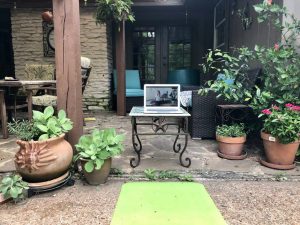Thoughts on coping with isolation

Here’s advice from people who know a lot about living in solitary, confined spaces.
There’s a wonderful article in the Guardian about how people survive – and even thrive – while living in highly isolated or confined spaces. It interviews a monk, a submariner, a round-the-world solo sailor, an Antarctic researcher, and someone who lives on a remote island. These people are experts in doing what all of us are struggling to do right now – passing time in relative solitude, trying to mark the progress of days that blend into one another, and retaining a sense of optimism and hope throughout. I loved the advice they offered and wanted to share some of it with readers.
Create routines.
All of them emphasized the importance of establishing a daily routine, no matter what’s going on, in order to stave off boredom and to feel productive. Get up at the same time, get dressed, have a plan. “It’s too easy to fritter away your time, and that is very soul-destroying,” said Christa Byrnes, the island-dweller. The Benedictine monk, Christopher Jamison, differentiated between boredom and lethargy:
“Lethargy is when there are things to do that you can’t be bothered doing. Most people suffer the latter, but they call it the former because it lets them off the hook.”
He warns that a failure to differentiate the day can cause it to “get on top of you.” Creating a schedule makes a day “more sustainable, bearable and enjoyable.” So, make yourself a plan – and a plan for your kids, if you have them, so that they too can feel a sense of satisfaction and accomplishment at what they’ve done. Even if it’s just a few hours of highly structured time in the mornings, with afternoons and evenings wide open, you will all feel much better. In my household, everyone has to get dressed after breakfast and brush their teeth and hair, as if headed to school. It marks the start of the day – and makes me presentable for my daily video call with coworkers.
Prioritize physical and mental wellness.
Submarine captain Ryan Ramsey believes in the importance of physical activity and its link to mental wellbeing. It is entirely possible to exercise in a confined space with limited equipment. Numerous coaches and gyms have moved their programming online, so it’s easier than ever to access great at-home workouts. Don’t give up on your physical health at this time. Make it part of your daily routine, and remember that something is better than nothing.
The same logic applies to sleep habits. Stick to your kids’ regular bedtimes, and establish a solid sleep routine for yourself. Wake up at the same time each morning and save the sleep-ins for weekends to mark them as special. Avoid caffeine late in the day and fight the urge to get sucked into a late-night Netflix binge during the week.
Retaining a good mental mindset is crucial, according to all of the interviewees. Ramsey recommends staying away from the news cycle; I’ve addressed this by avoiding Twitter and most online news (other than what I need to read for my job) and buying a single weekend newspaper that I then read for several days. A friend of mine deleted all his social media apps several weeks ago and said it has greatly reduced his distraction and anxiety. He told me, “Now I feel like I’m enjoying retirement, spending time on art and house projects and working out.” Jamison, the monk, encourages an attitude of gratitude, of being thankful for what we do have, and avoiding “rehearsing your grievances” first thing in the morning.
Find the bright spots.
I very much like the idea of having small things to look forward to. Round-the-world sailor Sir Robin Knox-Johnson said he enjoyed a single glass of whisky or brandy and a cigarette after dinner on his boat, but no more. I’m hardly circumnavigating the globe solo, but I’ve designated Fridays as “wine and Scrabble nights” with my husband, and it’s become a surprising bright spot for me, something to mark the end of the workweek and to kick off the weekend with a bit of fun.
 © K Martinko
© K MartinkoMy daily workouts in the garage have become something to look forward to, a brief hour of respite from my children when I can blast loud music and push my body hard. I even look forward to cleaning the house top to bottom every Saturday morning because it’s satisfying and creates a pleasant atmosphere for the rest of the weekend.
Last but not least, do what you can to enjoy this strange time, difficult though that may be. Consider the hobbies you can now develop, thanks to more free time on your hands. Experiment in the kitchen, expand your reading lists, go for solitary walks (if you can), and reconnect with old friends through emails or phone calls. Learn how to meditate, play board games with the kids, experiment with new makeup and hair styles, plant a vegetable garden, dust off an old instrument, or designate a few minutes each day to studying a foreign language. The point is to make the best of a tough time. To finish with Ramsey’s wise words, “Enjoy what’s there. Try to stay off the topic of what happens next. You can only control what you can control.”
Here’s advice from people who know a lot about living in solitary, confined spaces.
Please enable JavaScript to view the comments.







